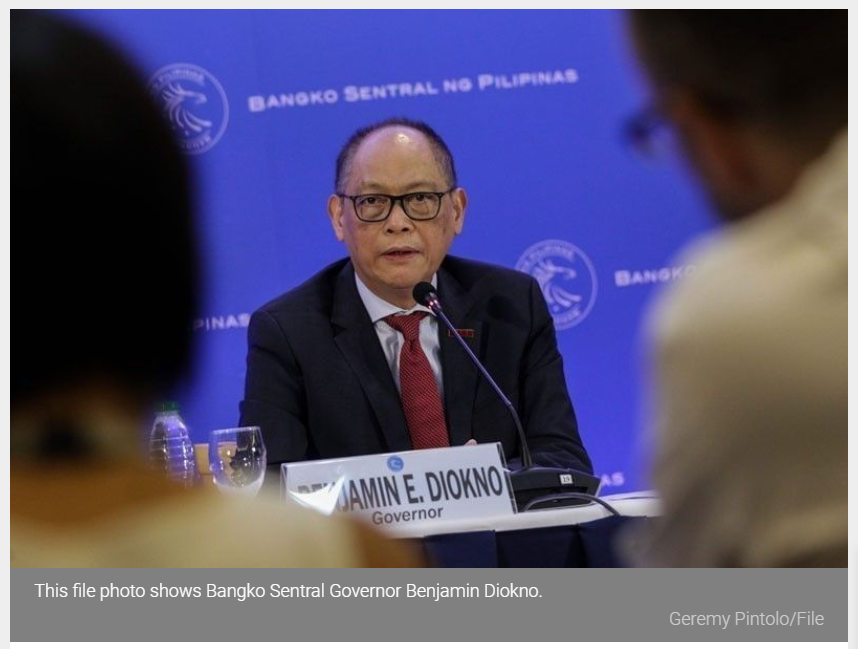Philippines: BSP signals to stay put on policy in ‘next few quarters’
MANILA, Philippines — Despite fresh data showing the economy sank into recession last quarter, there is no pressure on the Bangko Sentral ng Pilpinas (BSP) to further deploy monetary stimulus to assist on recovery from the pandemic.
Ahead of the central bank’s policy meeting on Aug. 20, BSP Governor Benjamin Diokno signaled monetary authorities are not considering cutting benchmark interest rates, which he said “will probably hold for the next few quarters.”
“There is no compelling reason why the BSP has to move sooner on further policy cut at this time,” Diokno said in a televised interview with ABS-CBN News Channel on Monday.
“Monetary policy works with a lag so our reading is the aggressive monetary policy easing is yet to be digested by the market. So I don’t see any pressure for adjustment,” he added.
Since March, when the pandemic erupted, Diokno has led the BSP’s most dovish decisions to bring down policy rates by 175 basis points to new a record-low of 2.25% and encourage borrowing, while giving banks ammunition to lend through a 200-bps cut on mandated reserves.
By central bank estimates, the moves released around P1.3 trillion in cash to the financial system.
BSP’s easing followed a Duterte administration’s thrust to rely on banks’ cash to salvage enterprises battered by pandemic and lockdowns enforced to slow the virus spread, but also consequently, crashed businesses and slowed down consumption. As a result, the economy plunged 16.5% year-on-year in the second quarter, the worst on record.
In a text message, BSP Deputy Governor Chuchi Fonacier said the central bank’s loosening strategies are starting to work for domestic companies. “Banks have continued to grant new loans or refinance existing loans to MSMEs and large enterprises since March 2020,” she said.
Citing BSP data, Fonacier said loans extended to micro, small- and medium-sized enterprises (MSMEs) rose to a daily average of P84.2 billion as of July 23 from P9.9 billion last March.
That credit formed part of lenders’ compliance to reserve requirements, a short-term policy adopted last April and May to encourage banks to lend to MSMEs, often considered a credit risk given their struggle to pay up, but are also extremely important to recovery as they account for 98% of local firms.
The improvement in MSME loan numbers, however, did not reflect in the overall portfolio. Big banks grew their loan portfolio 9.6% year-on-year in June, the slowest since October last year, signaling lower cash demand at a time when a bigger portion of the economy went back to business as restrictions were initially loosened.
Not worried by slower loan growth
Diokno is not worried. “I expect the measures and additional lending to pick up in the months to come… We’re not concerned that the loans — for example, has slowed down last June — but we expect them to pick up pretty soon in the next few weeks,” he explained.
Nicholas Antonio Mapa, senior economist at ING Bank in Manila, said Diokno and the rest of the seven-member Monetary Board are unlikely to ease policy further, not with current inflation of 2.5% as of June already eating up earnings from bank deposits.
“With real policy rates negative, we do not think Diokno will want to venture deeper into the red,” Mapa said in an e-mail.
“In terms of liquidity…, with excess of P1.6 trillion now sloshing back and forth between the market and BSP term and overnight deposit facilities, we do not expect adjustments to the (reserve requirement) any time soon,” he added.
Source: https://www.philstar.com/business/2020/08/10/2034238/bsp-signals-stay-put-policy-next-few-quarters


 Thailand
Thailand




